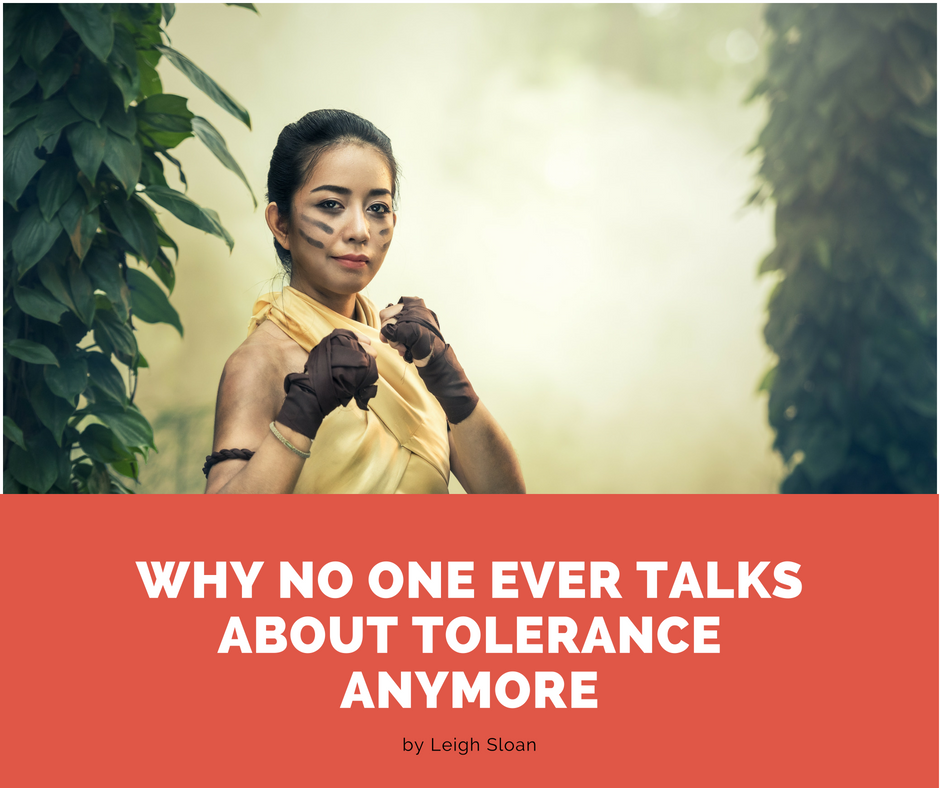Do you remember years ago when the word “tolerance” made its way into the public discourse? There was a lot of controversy around that word I think it was around the time that Brad started dating Jennifer on “Home Improvement,” but don’t quote me on that. I remember a new book coming out at the time written by Dr. Dobson’s son, Ryan entitled, “Be Intolerant, because some things are just stupid.” Many conservatives worried that tolerance was a sneaky way for social liberals to gain a foothold. And so, they rejected the use of the word altogether, proclaiming that they would not tolerate tolerance when it came to things that were purely “intolerable.” Others embraced the word tolerance, Christians and others acceded that the true meaning of tolerance does in fact line up with the values that they hold dear, even biblical values. So what do we do with this loaded word?
The word “tolerance” originally came from the idea of bearing up under a certain amount of suffering. Over the years it morphed into the biblical idea of “bearing with” those who were different from you in the way that they lived or the way that they believed, or the values they held. The operative meaning of the word was that it implied a clash, a suffering, a struggle, a gap to bridge.
A society that values tolerance is a very western democratic sort of society. Tolerance becomes very valuable in a society that affirms the right of free speech, for example. Such a society assumes that the best ideas will rise to the surface in the crucible of honest and free thinking men and women who are willing to at least tolerate or entertain a point of view that is different from their own.
In the gay rights movement, for example, the word was originally used to bridge the gap between those who did not agree with that particular lifestyle in an effort to help those people “tolerate” lifestyles that might be different from the ones they typically affirm.
But over time, the word was subtly dropped from the narrative because we inherently realized that if we subscribe to the idea of tolerance, we will soon have no choice but to practice this value ourselves. And this is what we do with words—we discard them when they give us a standard by which we do not want to measure ourselves.
Consider the recent case of the baker (Jack Phillips) who went to the Supreme Court because he refused to customize a cake for a homosexual couple. Keep in mind that this man was willing to serve the couple another more generic cake or pastry item, but his conscience did not permit him to violate his conviction in such a way that blatantly affirmed a gay marriage that he did not agree with.
In order to really see this issue clearly, I’d like to give you a hypothetical, which I call the practice of “moral mirroring.” To demonstrate moral mirroring, you flip the script and try the shoe on the other foot, so to speak. Here’s an example. Let’s flip the script on the Christian baker by considering the rights of an atheist who refuses to decorate a cake with a bible verse because it violates his beliefs. It is the same exact principle, even though in real life, the atheist is never the target of such litigation. Bigotry is refusing to serve someone or treat someone with respect based solely on perceived differences. Think of the bigot who says, “We don’t want her kind in here.”
Most of the time we contrast bigotry with affirmation….someone who throws flowers and celebrates all that everyone is and all that everyone does. I can tell you that that person exists…nowhere. We think that affirmation is the opposite of bigotry, but it’s not. It’s easy to “allow” someone to be the way they are if you agree with them and celebrate their lifestyle.
But tolerance is more brave than affirmation. It is more difficult because it is the choice to respect someone when and especially when you do not affirm what they do. Affirmation is easy, but tolerance takes character. It’s the willingness to stand in one’s own convictions enough to draw a line in the sand, but to make every effort to respect the line that another has drawn as well. That baker was practicing tolerance in that he was willing to serve the couple in many different ways. He only made a distinction where it clearly violated his convictions.
The sad truth of our current society is that we’ve slipped from true tolerance to affirmation as its inferior substitute. This “affirmation culture” is alogical in nature because it doesn’t stand the test of moral integrity or moral mirroring. We cannot in good conscience affirm the choices of every individual on the planet merely because people want to be affirmed. The right to be affirmed is nowhere in the constitution. In the same way that we cannot demand everyone to affirm Christianity, we also cannot demand that someone affirm and celebrate homosexuality, atheism or white supremacy.
If we want to bring back tolerance as a value, as I think we should, it has to apply to all people of all persuasions as long as bodily harm is not in question. (In the case of physical danger, that is a different conversation.)
So what does true tolerance really look like? How can we seek opportunities to show tolerance and how can we affirm those who do? Well, first we have to notice when we have a difference of opinion or different lifestyle choice from someone else. That’s easy enough. But the second step is harder.
Next, we have to make the choice to move toward those people, not away. We need to engage in business, in dialogue with these people, always with a curious posture. But we must never succumb to the tyranny of an “affirmation culture,” feeling like we are pressured into affirming things we cannot in good conscience believe or affirm. Treating someone well while you simultaneously refuse to affirm all their life choices is the essence of true tolerance.
Lastly, we need to notice and applaud people like Jack Phillips who do not necessarily affirm, but demonstrate tolerance toward groups of people that are different from themselves. We need to do the same for Muslims who bear with Christians and liberals who bear with conservatives. Such people serve where they can and graciously decline where (and only where) their convictions are in violation.
It’s time for tolerance to make a comeback for real this time. It can be a true virtue, not merely a euphemism. We cannot effectively celebrate diversity without tolerance. We cannot effectively participate in a democracy without tolerance. If we make the mistake of replacing tolerance with affirmation, we will most certainly lose the power of personal conviction. The soul of democracy itself demands that we agree together that true tolerance will be a virtue we choose to practice, to cultivate, and to applaud in others.

